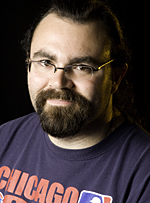Highlands University Graduate Student Jason Nevins Excels at Archaeology and Music
New Mexico Highlands archaeology graduate student Jason Nevins will be the first to do an in-depth study of ancient skeletal remains from the Philmont Ranch near Cimarron N.M.
Nevins participated in the university’s intensive four-week summer field school in 2009 at the 215-square-mile private ranch in the Sangre de Cristo Mountains. The rugged wilderness property is rich in ancient Native American artifacts.
Nevins said the Philmont field school helped ground and clarify the idea for his thesis.
“My research will assess the overall health of the population through lab analysis that determines age, sex, stature and ancestry,” Nevins said. “Bone features can show signs of poor nutrition and disease. I expect to find good health and signs of longer lives in my study sample because there’s archaeological evidence that these ancient people lived in an area rich in natural resources, and managed their water resources well.”
“Jason is a very meticulous, detail oriented student, which is extremely important in archaeological field work,” said anthropology professor Warren Lail. “He’s very self motivated and excelled in the Philmont Ranch field school.”
Lail said Nevins always managed his fieldwork responsibilities well, whether he was using the high-tech total station to survey archaeological sites or getting up at 4 or 4:30 a.m. to work as many hours as possible before the heat of the day set in.
Lail said Nevins has serious potential as an archaeologist.
“Without question, he has the ability to pursue a Ph.D. in anthropology and succeed in the archaeology field,” Lail said. “We’re lucky to have a number of outstanding students in our program and Jason is one of them. He’ll be presenting his preliminary research for his thesis at the annual meeting this year for the Archaeological Society of New Mexico.”
“Warren always says archaeology is a big puzzle,” Nevins said. “Hopefully, my thesis will contribute a piece to the puzzle that builds a picture of what life was like for the people who lived in the mountains and valleys of the Cimarron area more than a thousand years ago.
“What appeals to me about archaeology is that when you look at a culture, either past or present, if you really try to understand the culture, it fosters respect, tolerance and compassion. It’s very interesting what you can learn about a past society by examining its artifacts,” Nevins said.
Nevins isn’t just a promising future archaeologist. He’s also been a musician since the fourth grade, when he picked up his first drum sticks.
Nevins plays percussion in the university’s marching band, pep band and concert band. He has also played in the jazz band.
“Music is a good way to express myself and is my outlet,” Nevins said. “There’s also a certain synergy you strive to achieve when you’re playing with other musicians. That’s satisfying.”
“Jason is a very talented and creative musically,” said Edward Harrington, music professor and band director. “He’s always trying new things on the drum kit, using his jazz experience to improvise new music on the spot. He’s one of those dream students you always want in your program. He’s very dedicated and even schedules extra rehearsals outside of class time.”
Harrington said Nevins encourages and helps other students, and is a positive role model for less experienced musicians. In 2009, Harrington nominated Nevins for a Highlands University student leadership award, which he received.
As for the future, Nevins says anthropology is his passion and future profession but music will always be an important part of his life.
“There are so many roads ahead,” Nevins said. “A Ph.D. in anthropology is definitely one of my life goals.”

